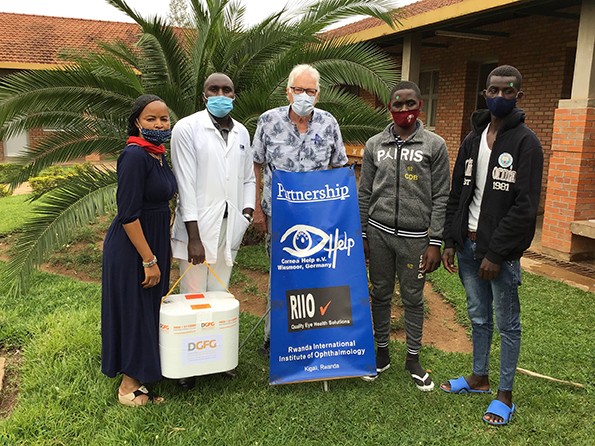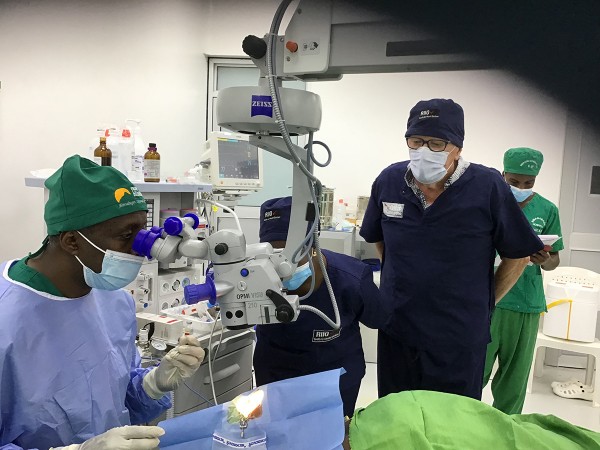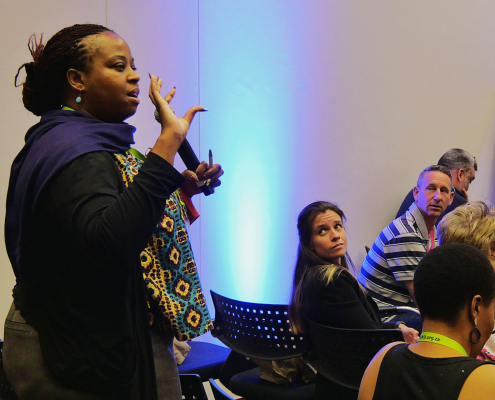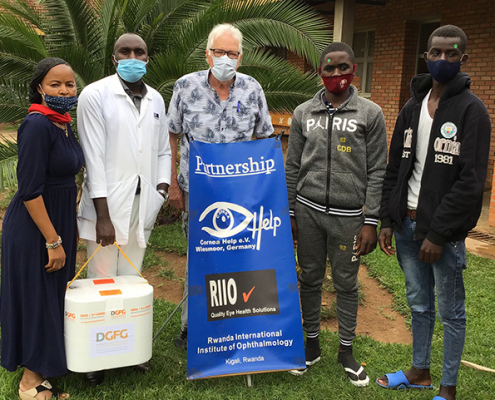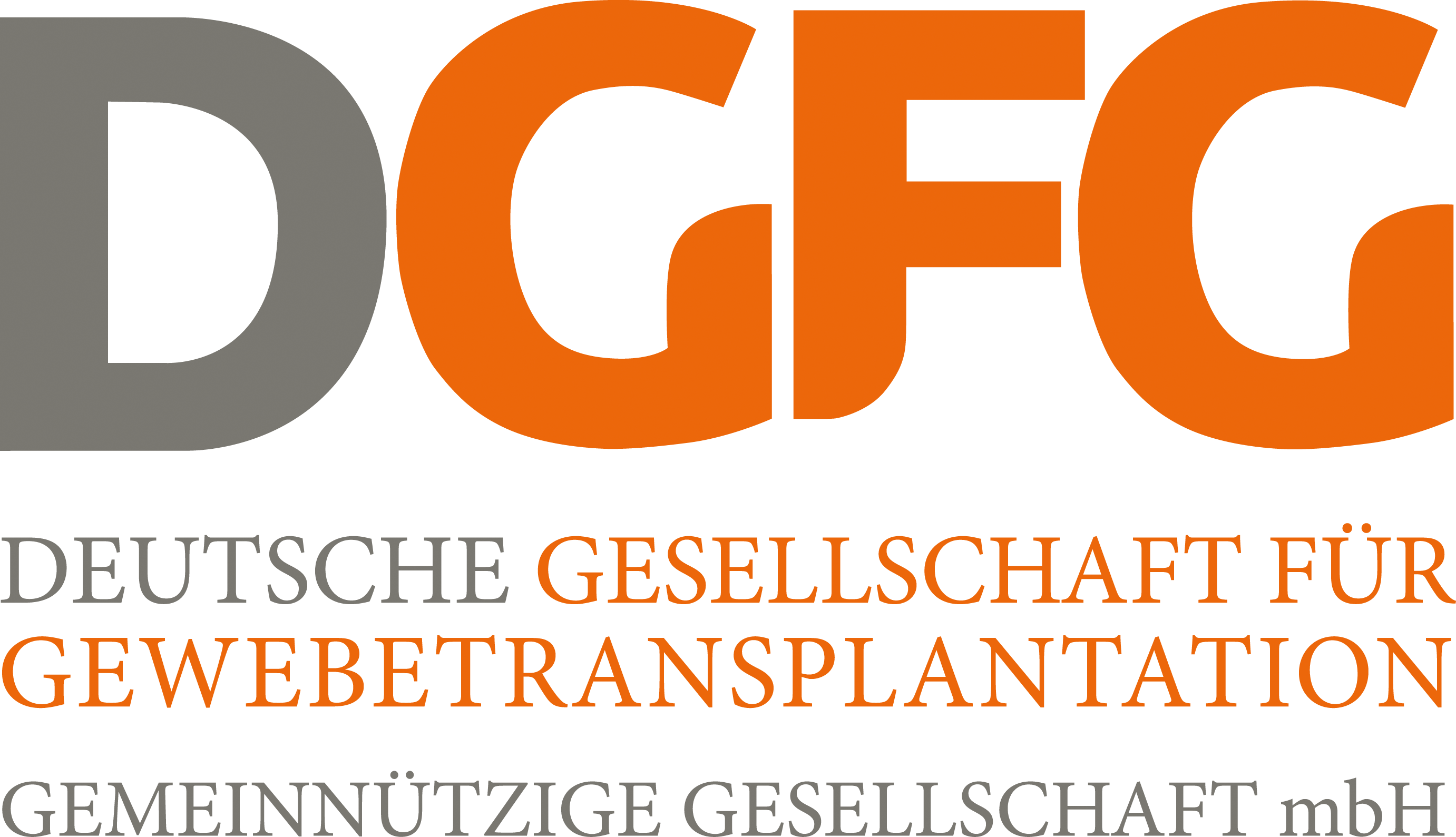Sight for Rwanda
DGFG supports Cornea Help e. V. to combat corneal blindness
On November 13, 2021, Klaus Renken, chairman of Cornea Help e.V., traveled to Rwanda for the first time since the outbreak of the corona pandemic to save three patients from severe eye diseases: “I am delighted to be able to fly to Africa again, together with three corneas for which the patients in Rwanda have been eagerly awaiting for many years,” said Renken (photo, center right). The corneal transplants come from the network of the non-profit organization DGFG – the German Society for Tissue Transplantation (Deutsche Gesellschaft für Gewebetransplantation), donated by deceased persons in the context of altruistic tissue donation.
“Countries like Rwanda depend on our help. Tissue donation facilities like the NPO DGFG or even donation programs and tissue banks do not exist,” Renken explained. “We are therefore in close contact with local doctors. They let us know when help is urgently needed. Then, Cornea Help takes over the further organization, in this case with the support of the DGFG.” Ophthalmologist Dr. John Nkurikiye of Kigali’s Dr. Argawals Eye Hospital has registered three of his patients for corneal transplants (keratoplasty) with DGFG. “Medicine stops at no borders even in the allocation of tissue transplants. We are pleased to be able to provide the three patients in Rwanda with suitable corneas,” said Regina Michaelis, head of DGFG’s tissue allocation office from Hanover.
Klaus Renken personally accompanied the patients on site during the operation. “We are always present at the operations ourselves. We maintain very close contact with the doctors and patients and want to make sure that the help arrives exactly where it is needed,” explains Klaus Renken, who founded the Cornea Help association in 2009. Since then Klaus Renken and his wife Sigrid Renken have been committed to the treatment of patients with corneal diseases. The reason: A former work colleague had also a severe corneal disease and was in danger of going blind. At that time, Klaus Renken and his family did everything in their power to help this man – as they are doing today, with this three patients in Rwanda. “Thanks to the financial support of many private individuals, but also of companies, we have already been able to help more than 100 patients see clearly through a donated corneal transplants again in many African countries, including Rwanda.”
Your donation counts!
Cornea-Help is a registered association (e. V.) in Wiesmoor, Northern Germany. Their activities are based on voluntary commitment – therefore the association depends on donations. Operations, medicines and last but not least board and lodging for patients can be financed this way. Even small amounts can make a big difference!
Cornea Help and DGFG want to jointly establish a program for the donation, processing and transplantation of corneas in parts of Africa.
Each year, 9,000 corneal transplants are performed in Germany. The need is estimated to be much higher. Patients still have to wait several weeks and even months for a suitable corneal transplant, even in here in Germany. A corneal transplant is always the last therapeutic option and the only chance of salvation from corneal blindness. Each transplant comes from tissue donation and is a gift to the life of a patient in need, given by a deceased donor. While in Germany, despite one of the best health care systems worldwide, there is still a shortage of donor tissue, the picture in Africa is much more drastic: Here, the few African patients who receive a corneal transplant in their own country can count themselves among the lucky exceptions. The need for corneal transplants in Africa is high: corneal injuries, scarring or severe eye diseases are frequent indications. Another reason for a high demand for corneal transplants is also the often insufficient medical care or preventive therapy: supposedly mild infections of the cornea are detected too late, often not treated in time, so that patients are often threatened with the loss of their vision. But an available donor cornea and doctors who have the necessary know-how are unfortunately still the rare exception in many regions in Africa. Yet there would be sufficient cornea donors in Africa, just as there are in Germany.
Visit planned to Africa in 2022!
Patients like Straton, who received a corneal transplant thanks to Cornea Help and has since been able to see something again for the very first time in twelve years, including his wife and children, are the reason why Cornea Help and DGFG want to change this situation – by joining forces. A joint visit to Africa is planned for 2022, during which important contacts from politics and medicine will meet to establish a long-term self-sustaining donation program, supported by local authorities. In a second step, the establishment of tissue banks and ultimately medical training in the country will also be promoted. Until now, corneas have often been imported from countries such as the USA or Germany. This is not a sustainable solution!
Only if the countries of Africa themselves succeed in carrying out tissue donations independently, can a better and safer patient care with corneal transplants be guaranteed in the long term. “This is exactly the goal of our initiative: help for self-help”, said Martin Börgel, managing director of the DGFG. This initiative has a lot of potential for success and is supported in a non-profit and professional manner: Here, twelve years of experience of Cornea Help e.V. in the support and realization of corneal transplantations in many African countries come together with 15 years of experience in the successful establishment of a tissue donation program and a nationwide network of tissue banks and transplanting institutions by DGFG. For more information on the two organizations, visit Cornea Help and DGFG.

